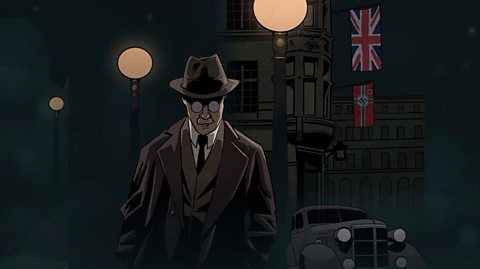Uniting the nation
'We will fight on the beaches.' 'This was their finest hour.' 'Never was so much owed by so many to so few.'
Winston Churchill's memorable speeches strengthened Britain's resolve during the dark days of World War Two. He had long understood the power of words, writing at the age of 22: "Of all the talents bestowed upon men, none is so precious as the gift of oratory. He who enjoys it wields a power more durable than that of a great king."
But public speaking didn't come naturally to Churchill. He had to overcome ridicule and a speech impediment. So how was he able to transform himself into the public speaker he is recognised as today and just how crucial a role did his speeches play in winning the war?
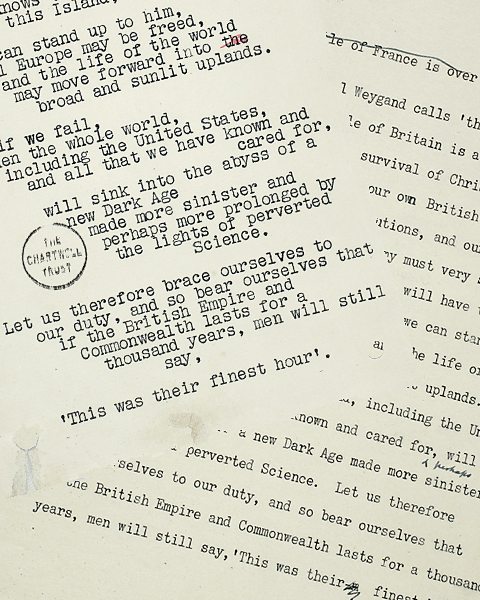
How Winston weaved his words
When Churchill became Prime Minister in May 1940 he was aware of the importance of oratory in inspiring a nation at war.
He had to overcome criticism about his delivery and a vocabulary that was often seen as old-fashioned. But the dramatic events of the summer of 1940 rose to a level of drama that suited the Churchillian prose.
ChurchillÔÇÖs speeches were not off-the-cuff, he spent much time preparing and practising saying them out loud, helping him overcome the nervousness he had felt about public speaking since his youth.
Unlike most modern politicians Churchill didnÔÇÖt employ speech writers. He was his own spin-doctor, quipping that ÔÇťhistory will be kind to me, for I intend to write itÔÇŁ. He was a great writer, winning the Nobel Prize for Literature in 1953, and he spoke of how he wrote speeches like psalms, setting out his notes in a distinctive 'Psalm form'. The phrased passages helped him to maintain the right cadence in his delivery, and he made use of rhythm and dramatic pauses.
Churchill used emotive language, metaphor and powerful imagery, delivering his speeches with such authority that they strengthened the nationÔÇÖs resolve during the darkest of days. He understood how to use words to let the listenerÔÇÖs imagination take over, transporting them to the scene of the battle. Churchill had mastered the art of alliteration, often repeating the same sounding words for maximum impact.

The dentures that won the war
Churchill hated his lisp and at school he attempted to eradicate it by practising saying ÔÇśThe Spanish ships I cannot see for they are shelteredÔÇÖ.
But by the time he became prime minister, he had come to value his lisp as a crucial weapon in the war effort, as he believed it gave him an authentic sound in his radio broadcasts. So he had his dentures specifically designed to preserve his lisp.
One set of the dentures auctioned in 2010 for over ┬ú15,000. The other existing set is in the Hunterian Museum at the Royal College of Surgeons in London. The museumÔÇÖs Jane Hughes, described their significance: "These really are the teeth that saved the world. Without them, 'fight them on the beaches' would never have sounded the same. They were vital to the war effort."
A 2010 91╚╚▒Č News report tells the remarkable story of Churchill's dentures.
The power of Churchill's roar
Colonel Tim Collins reflects on how much Churchill has influenced him and assesses why 'Churchill's roar', in the form of his many speeches, continues to inspire today.
His finest hour?
Arguably ChurchillÔÇÖs most famous speech came on 18 June 1940, when Britain stood alone after the fall of France.
Copies of his 'Battle of Britain' speech held at Cambridge UniversityÔÇÖs Churchill Archives Centre reveal the amount of time Churchill spent drafting and redrafting it.
The archiveÔÇÖs director Allen Packwood explains how Churchill edited the speech until the last moment. "The page is covered with his handwritten annotations. He knew how much was riding on this, but he is able to craft the oratory in this moment of extreme stress.ÔÇŁ
Although it is now widely credited with galvanising the nation ahead of the invasion of the German Luftwaffe, the initial reaction to the speech in the Commons was less than enthusiastic, as author Dr Stephen Bungay explains:
ÔÇťChurchill gave his address in the Commons in the afternoon and then broadcast to the nation that evening. His Private Secretary wrote that ÔÇśhe spoke less well than on the last occasionÔÇÖ. MP Harold Nicolson recorded that he thought Churchill sounded ÔÇśghastlyÔÇÖ, while newspaper owner Cecil King thought he was either ill or drunk. Churchill did the entire broadcast while smoking a cigar, which along with his lifelong difficulty in pronouncing the letter 's' might account for the impression that he was drunk.ÔÇŁ
Despite that initial scepticism, ChurchillÔÇÖs words inspired the British people. A 91╚╚▒Č Office report on public opinion conducted the following day found that the anxiously awaited speech was considered 'courageous and hopeful'. ChurchillÔÇÖs popularity grew from there with a Gallup poll conducted in July giving him an 88% approval rating.
Audio of Churchill's Battle of Britain speech. (Images courtesy of Churchill Archives Centre, Cambridge, reproduced by Curtis Brown. Also courtesy of Getty Images).
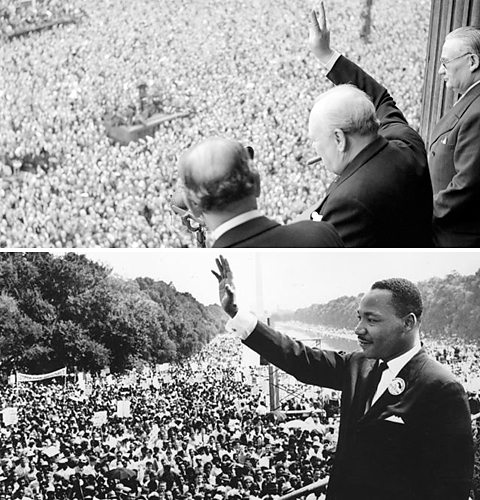
Tim Collins on what makes a great speech
Having given many speeches in the Army I understand that a powerful speech can urge soldiers to go forward by helping them realise that the shame of stepping back is far worse than anything that might happen by advancing. But what does it take to make a great speech?
In 91╚╚▒Č FourÔÇÖs Speeches That Shook The World, poet Simon Armitage said a speech should appeal not just to the head, but to the heart and guts. Armitage explained: ÔÇťSpeech-making is the art of persuasion. There are lots of rhetorical techniques, but the most important element is that you structure your argument clearly. The right words, a strong argument, powerful delivery charged with emotion can inspire action."
Martin Luther KingÔÇÖs iconic ÔÇśI have a dreamÔÇÖ speech achieved all these objectives, as did ChurchillÔÇÖs war-time speeches. I believe the vital role Churchill and his inspirational speeches played in helping win the war cannot be over-estimated. He inspired a people to fight on after their allies had fallen and he inspired the Empire to back Britain, which was vital.

Learn more about this topic:
Sir Winston Churchill: The greatest Briton? document
From schoolboy failure to wartime hero, Winston Churchill's astonishing life has made him a British icon. Discover how he came to be the man we remember.
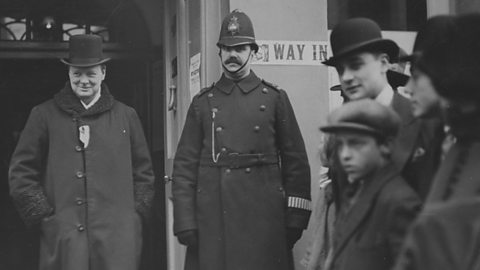
WW2: How did the British plan to celebrate VE Day? document
VE Day or Victory in Europe Day was on 8 May 1945, following Germany's surrender in WW2. But how did Britain plan for one of the greatest days in its history?
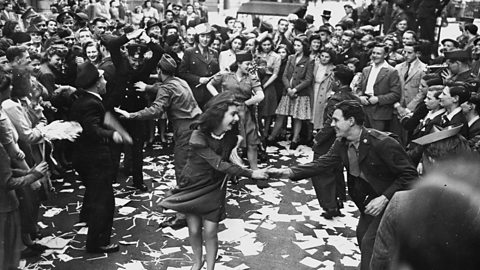
WW2: "Tell Me Your Secrets" - An interactive graphic novel. game
Can you save Britain from the Nazis by carefully sharing secrets with America? Based on Sir Henry Tizard's real mission, choose carefully in this graphic novel.
